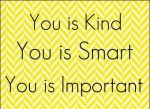I’ve been teaching my new mindfulness class “Don’t Worry. Be Mindful.” for the past two days so I thought I’d share some of the info here since mindfulness can be one way of practicing self-care. If you’re new to mindfulness, it’s defined as “paying attention to the present moment on purpose without judgement.” Now, if this sounds like something more to add to your to-do list, it’s not. One benefit of mindfulness is that you can practice it while you go through your day without adding anything.
We call this “informal” practice. For example, when you’re showering, direct your attention to the sensory experience of taking a shower-sounds, touch/feeling, smells, sights and taste (well, maybe not taste although when shampoo gets in my mouth…). If thoughts occur, note them by saying “Thought-Planning-Overthinking, etc,” and then re-direct your attention back to the sensory experience of the shower. At first, you may spend most of going from thought to sensation, thought to sensation and back again. Don’t worry, that’s completely normal. The idea is to let whatever happens happen without judgement which is another benefit of mindfulness. It teaches you to treat yourself with self-compassion instead self-judgement or self-loathing which we in the western world are ever so good at.
As in mindfulness, self-compassion or self-love is a key aspect of self-care. Likewise, letting go of your worries and thoughts and just allowing yourself experience the richness of the moment you’re in, helps nourish you-mind-body and spirit. Research has shown that practicing present moment awareness, i.e. mindfulness, diminishes stress, tension, pain, depression, and anxiety and strengthens your ability to cope with life changes, improves your health and immunity, and increases feelings of joy and well-being.
Last week, Time magazine ran a feature article about “The Mindful Revolution” which you can read by clicking on this link-http://content.time.com/time/magazine/article/0,9171,2163560,00.html.
This week your assignment (should you choose to accept it), is to pick one activity you do on a daily or regular basis, like showering, doing the dishes, driving to work, and focus on your sensory experience of the activity rather than the thoughts or “tickertape” running through your head, as one class participant described it Saturday. Do this without judgement, understanding that your mind is likely to drift from thought to sensation and sensation to thought frequently. Remember, mindfulness is realizing your mind has wandered, so when this occurs, stop, take a breath, and re-direct your attention to the moment you’re in. That’s mindfulness!
Namaste.

